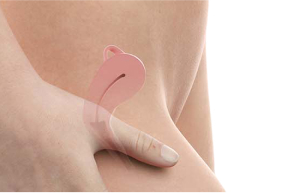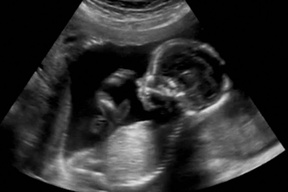You at 4 months pregnant
If you're still suffering from morning sickness, you may be one of the few women who continue to experience nausea throughout pregnancy. If so, you should consult your healthcare professional to address your concerns.
As your baby grows bigger your belly grows with it and you may be starting to consider or even make use of some maternity wear now. Maternity pants and maternity bras are especially helpful to maintain your comfort levels as you grow.
If you are feeling persistent butterflies or bubbles in your belly, chances are it's your baby moving around. Your baby's first kicks and punches are commonly called quickening or flutters. They are very small, and mothers often mistake this sensation as having a hungry grumbling stomach.
Your baby at 4 months pregnant
His or her eyes are moving into their forward-facing position and although their head is seemingly large, their body is rapidly catching up.
Most excitingly, your little one's face is now fully formed. Their newest trick is experimenting with different facial expressions. But don’t worry if you see your baby frowning or squinting during an ultrasound. They are simply moving their muscles, not trying to communicate their mood.
You will also notice that your baby is now responding to the outside world. If you poke or push your belly, you might be able to feel your baby wiggle out of the way.
Another prominent feature of your baby this month is the fine coating hair (also called lanugo) that covers their entire body. Until your little one puts on enough fat, this hair will protect him or her and keep them warm and cozy.
Things to think about
If constipation is giving you a hard time, make sure you are exercising regularly. You should also keep up your fluids (no alcohol though) and load your pregnancy diet with plenty of fiber-rich fresh fruit and vegetables.
Due to your increased blood flow, it's common for the veins in your legs to bulge. If they are becoming uncomfortable, try wearing some support stockings and rest with your feet up when you can.
From conception to birth, track your pregnancy week by week with Huggies.
The information of this article has been reviewed by nursing experts of the Association of Women’s Health, Obstetric, & Neonatal Nurses (AWHONN). The content should not substitute medical advice from your personal healthcare provider. Please consult your healthcare provider for recommendations/diagnosis or treatment. For more advice from AWHONN nurses, visit Healthy Mom&Baby at health4mom.org.










